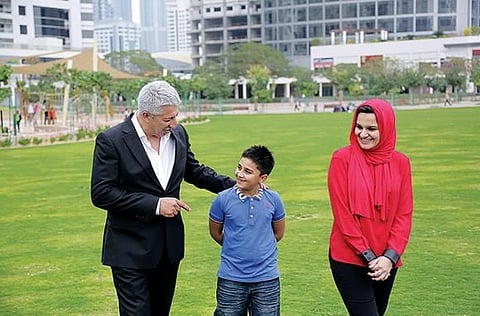Hypnotised to overcome their traumas
Parents turned to hypnotherapist and Friday expert Russell Hemmings to help their children

Nine-year-old Zarek Reza’s weight ballooned because of his love for fast food and video games. His mother Iqra, from Dubai, tells his story
Zarek was on the sofa again, mouth open, his hand dipping in and out of the crisp packet until they were all gone, eyes never leaving the TV screen. With his free hand, he played on his Xbox, game after game.
At nine, when most boys wanted to be out playing sport, my eldest son stayed indoors glued to the TV, snacking on fizzy drinks, sweets, pizzas and burgers. It was my own fault. He was my first of three children and I spoiled him. I was running a business and couldn’t monitor what had become a bad habit, but flipping through the family album one day I realised just how big Zarek had become. From an averagely built boy weighing around 28kg at seven, he ballooned to around 42kg in two years.
After just two sessions, I noticed a shift in Zarek’s behaviour. He was far more confident and had taken on board Russell’s messages about eating well and exercising. In fact, together we talked about the kind of food he should be eating and decided on what dishes to make – like grilled chicken breast, or poached fish. He needed just three sessions for the changes to be noticeable.
Now, five months down the line, Zarek is a totally new kid and has lost 7kg. He has ditched junk food, he understands sweets are a treat and his diet is full of fruit, vegetables and lean protein.
Changing Zarek’s diet has been good for all of us as a family as we’re far more conscious of what we eat. The best thing though, is that Zarek is so much more active now and keen to be playing football with his friends rather than being indoors.
The expert’s view
By re-programming Zarek’s mind using a series of hypnotherapy procedures, I managed to coax him to naturally choose to eat healthily and want to exercise.
I helped to match the inner Zarek to the outer one. This part of therapy is important because it helps the young person to identify what the real issues are. Using positive messages rather than focusing on the negative is far more effective.
Shreyas Karthik, 14, was a good student until a bullying incident made him lose his confidence. His mother Padmapriya, from Jumeirah, explains
Smiling, I watched my son playing his violin, our friends and family enjoying it as much as he clearly was. I was so proud of Shreyas – he was a talented musician and hoped to play in a band.
He was always a happy and fun-loving boy, who had a nice circle of friends whom he enjoyed being with. But then he began to change. He’d been bullied about his appearance when he moved to a new class and he became withdrawn. He became anxious about being in public, and was reluctant to go out and meet people or friends. He didn’t want to play sport, and would speak just a few words to us.
He’d always been so chatty and at first I thought it was a teenage phase, and hoped it would pass quickly.
But he became quieter and would lock himself away in his room, reading or playing video games. I thought these were normal adolescent changes and hoped he would grow out of this phase quickly.
Shreyas was a bit worried when he first met Russell. His confidence was low and he was reluctant to open up to him.
But over the course of the first session, Russell managed to draw Shreyas out of his shell – and by the end he was chatting with him as though he had known him for years. Shreyas told me that the first thing Russell did was demystify hypnotherapy by telling him that contrary to myths about the subject, a hypnotised person does not lose control over his actions.
The expert’s view
Russell: Teenage years can be an emotional roller coaster. The combination of peer pressure, high expectations and hormones can lead to feelings of isolation and poor self-image among children. The first thing I taught Shreyas was how to handle the bullies and gave him a number of coping strategies that really helped him.
I told Shreyas that reacting to jibes and comments about him was like giving those unpleasant people extra oxygen. Bullies love the reaction they get from their victims. It gives them a feeling of power. Bullies often feel powerless themselves and that’s why they hurt others so they rid themselves of that feeling temporarily.
I made Shreyas understand how important it was to build his own feeling of inner strength. I worked with him to develop positive mantras about himself that he could use every day in school and elsewhere. I set Shreyas small achievable targets – like taking the lead role in a group task session; speaking in front of the class or even a mirror to help him overcome his social anxiety issues. I also taught him how to walk confidently – head held high, chest puffed out and with a smile. This worked to build his confidence and self-esteem.
I made him understand the importance of academic achievement to his future.
Within three sessions, Shreya learnt to totally ignore negative comments and focus on the things that are important for his academic and all-round growth.
Now he spends hardly any time playing computer games and enjoys participating in a variety of activities. He has even enrolled in a gym and is building his muscles, which I think makes him feel more in control. His confidence has rocketed, he’s happy and he’s ready to take on the challenges of grade 10.




